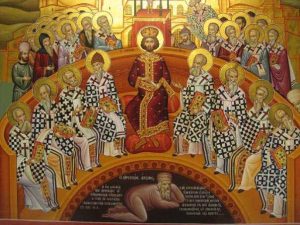 In addition to the observance of the 8th Sunday after Pentecost, the Church remembers the Father of the First 6 Ecumenical Councils. Moreover, the Church also liturgically recalls the memory of the Great Holy Prince, and Equal to the Apostles, Saint Vladimir.
In addition to the observance of the 8th Sunday after Pentecost, the Church remembers the Father of the First 6 Ecumenical Councils. Moreover, the Church also liturgically recalls the memory of the Great Holy Prince, and Equal to the Apostles, Saint Vladimir.
Today we celebrate the memory of the church teachers and pastors who in six councils held over three plus centuries (325-680) defined for us and for our faith who Jesus our Lord is. The central affirmation was in the Council of Chalcedon, whose fathers professed: “we all with one voice teach the confession of one and the same Son, our Lord Jesus Christ: the same perfect in divinity and perfect in humanity, the same truly God and truly man, of a rational soul and a body; of one essence with the Father as regards his divinity, and the same of one essence with us as regards his humanity; like us in all respects except for sin; begotten before the ages from the Father as regards his divinity, and in the last days, for us and for our salvation, the same born of Mary, the virgin God-bearer, as regards his humanity.” Even though the Oriental Orthodox Churches did not accept this council for political and semantic reasons, there is no doubt that they believe that our Lord is truly God and truly a human being, because this is essential for our faith. This feast reminds us that we are through faith truly united with God, who transforms us and restores the divine likeness.
St. Maximus the Confessor especially emphasizes this in his theology, in many places, as in his Ambigua 4,8: “For there is nothing more unified than He, who is truly one, and apart from Him there is nothing [1045A] more completely unifying or preserving of what is properly His own. Thus, even when He suffered, He was truly God, and when He worked miracles the same one was truly man, for He was the true hypostasis of true natures united in an ineffable union. Acting in both of these natures in a manner suitable and consistent with each, He was shown forth as one truly preserving them unconfused, while, at the same time, preserving Himself without change, insofar as He remained impassible by nature and passible, immortal and mortal, visible to the eyes and known by the intellect, as God by nature and man by nature.”